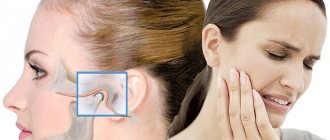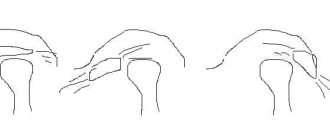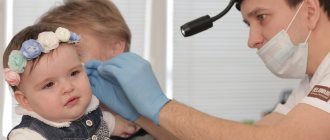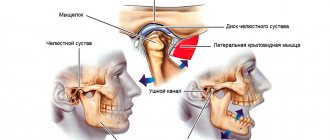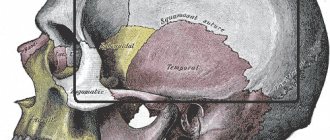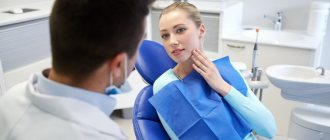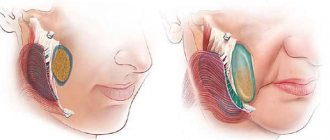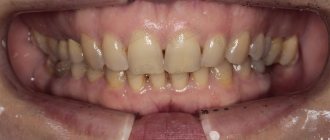Does your jaw click when chewing or when at rest? This is an alarming symptom that indicates certain pathologies of the dental system. It is imperative to consult a dentist, since wasting too much time can lead to inflammation of the joints, loss of teeth and other negative consequences that will have to be treated surgically.
Causes
Clicking in the ears, not associated with swallowing, occurs when the muscles of the hearing aid contract. This occurs with muscle spasm, as well as due to swelling of the auditory tube. Swelling accompanies infectious diseases of the ENT organs (otitis of a bacterial or fungal nature, sinusitis, pharyngitis), Meniere's disease (fluid accumulation in the inner ear), habitual dislocation of the jaw. With arthritis and arthrosis of the jaw joints, patients are bothered by crunching and clicking noises due to damage to the cartilage tissue. Ear plugs lead to pronounced clicking sounds when swallowing, as the patency of the auditory tube is impaired.
Monotonous tinnitus occurs with high blood pressure. The cause may be not only chronic hypertension, but also stress, heat stroke and intoxication. Complex noises that are auditory hallucinations are often a sign of mental illness. In any case, no matter what reason the patient suspects, self-medication is not worth it. A timely visit to an otolaryngologist for diagnosis and treatment is the best solution if noise or clicking occurs.
Why does my jaw click when I open my mouth?
Most often, such clicking is caused by jaw arthritis. This pathology affects the cartilage layer of the joint or meniscus. Accordingly, the meniscus becomes thinner, the fibers become looser, and the cartilage can partially fuse with the articular head. As a rule, the clicks in this case are multiple, resembling a crunch.
The sound is formed as a result of the movement of the articular heads, which overcome the boundary in the form of folds of the cartilage disc. This crunch can be muffled, and therefore only audible to the person himself. Very often the jaw crunches when the mouth is opened sharply, when subluxation of the joint occurs. With some difficulties, but the jaw can be returned to its place. But sometimes this is impossible on your own - the patient is diagnosed with a dislocation, and here the help of a surgeon will be required.
Symptoms
If clicks in the ears are associated with swelling of the inner ear, then the ENT doctor will be able to objectively record them during the initial examination. Patients with inflammatory diseases of the ENT organs are also concerned about fever, congestion and pain in the ears (usually “shooting”), and possible ear discharge. With lesions of the jaw joints, patients complain of pain when chewing and a feeling of dislocation, often accompanied by an increase in temperature.
With tinnitus, against the background of high blood pressure, patients complain of weakness, headache, nausea, spots before the eyes. The skin of these patients is hyperemic, and convulsions may occur. With heatstroke, your body temperature rises, your pulse becomes rapid and weak, and your breathing becomes faster. These conditions require emergency medical attention.
Why do jaw joints click differently?
This depends on the nature of the disease. Here are the most common types of clicks:
- intense - a sound that is heard by others;
- clicks that only the patient hears when talking or chewing food;
- clicks in a calm state, when a person does not move the jaw at all;
- clicks that only a specialist can hear using special equipment. The person does not hear them.
Types of clicks, depending on the moments of playback:
- with the mouth wide open;
- when the mouth is slightly open;
- in a calm state;
- when chewing;
- when talking;
- when yawning;
- when the patient closes his mouth;
- when closing the jaws, etc.
Diagnostics
It is necessary to conduct a general and biochemical blood test to determine the presence of infection, a microbiological analysis of a smear from the ear and nasopharynx. An ENT doctor examines the level of hearing and the patency of the auditory tube. X-rays and MRIs can determine the presence of inflammatory diseases, lesions of joint tissue or neoplasms; An ultrasound is performed to determine the condition of the hearing organs. In case of hypertension, blood pressure and ECG measurements are required. In the absence of physiological changes leading to tinnitus, consultation with a psychotherapist is necessary.
Why does this happen?
- Muscle tone, this can occur due to excessive clenching of the jaw, for example, when playing certain sports
— Jaw dislocation and any other injury
— The presence of extensive caries in the oral cavity with tooth decay, damaged dentures, incorrectly installed fillings
- Bruxism, better known as teeth grinding
— Joint fatigue, joint subluxation
— Arthritis of the mandibular joint
Treatment
It is clear that due to various reasons for the appearance of noise, treatment methods can vary significantly in each case. If the clicking in the ears is caused by the presence of wax plug, it is removed in a hospital setting. In the presence of infection, complex antimicrobial therapy is carried out - antibacterial or antifungal drugs, antihistamines (Diazolin, Suprastin, Loratadine) and vasoconstrictors (Otrivin, Naphthyzin, Polydexa), non-steroidal anti-inflammatory drugs (Nurofen, Ibuprofen). In case of severe muscle spasm, muscle relaxants (Drotaverine, No-Shpa) are prescribed. For lesions of the jaw joints, it is recommended to take chondroprotectors (Glucosamine, Chondroitin).
The accumulation of fluid in the inner ear requires the prescription of antipsychotics (Aminazin, Triftazin) to normalize the functioning of the vestibular apparatus and diuretics (Diacarb, Veroshpiron) to reduce the level of edema. Pneumomassage of the eardrum, performed by an otolaryngologist, is also indicated. Tinnitus with hypertension requires treatment of the underlying disease. To normalize blood pressure, beta-blockers (Anaprilin, Metoprolol), sedatives (Persen, Novo-Passit), ACE inhibitors (Captopril, Lisinopril, Ceronapril), calcium blockers (Nifedipine, Manidipine), diuretics are prescribed.
If tinnitus reduces the patient’s quality of life, along with drug therapy, the use of psychological techniques may be recommended to reduce the severity of subjective perception of noise.
The reception is conducted by specialists
Kirillov Evgeniy Sergeevich
Audiologist
Cost of services
Initial consultation with an audiologist
1200₽
Repeated consultation with an audiologist
1000₽
Common causes of clicking in the ear
If we consider possible pathologies, then first of all you should pay attention to the condition of the cervical spine. If you lead a sedentary lifestyle and engage in sedentary work, then there are likely structural changes that prevent normal head movements in full amplitude. The sound source may be located in the cervical spine, and to the ear it is perceived as if it is located inside the auricle. Such a symptom may indicate the presence of spondylosis, vertebral instability, spondyloarthrosis, or deformation of the ligamentous apparatus.
Common causes of a clicking ear also include the following:
- violation of physiological posture in the thoracic and cervical spine;
- vertebral displacement;
- disruption of the conductivity of the vascular bed in the cerebral vessels;
- arthrosis of the mandibular joint;
- change in bite;
- pathologies of the vertebrobasilar apparatus;
- damage to the eardrum and much more.
Associated symptoms will help determine the suspected cause. In particular, if there is pain in the corners of the jaw, convulsions of the facial muscles appear, then trigeminal neuritis is possible - a very difficult disease to treat. Dizziness, headaches, general weakness and constant fatigue can be a consequence of cervical osteochondrosis or vertebral artery syndrome. With a curvature of the spine, you may feel excessive tension in the muscles of the back and neck on one side.
You can find out the exact reason for the clicking in your ear when you visit a specialist at our clinic. If necessary, additional diagnostic examinations will be carried out. After an accurate diagnosis has been established, effective treatment using manual therapy methods will be offered.
What pathologies can we talk about?
From the list of diseases that can provoke the manifestation of constant creaking in the ear, we can highlight:
- inflammation of the maxillary and paranasal sinuses;
- nasopharyngitis;
- adenoiditis;
- violations of the anatomical integrity and deformation of the nasal septum;
- chronic and allergic rhinitis;
- polyps in the nasal cavity;
- tumors and cysts localized in the nasopharynx.
Creaking in the ear often occurs in patients experiencing nasal congestion. Often the symptom appears with a common cold. In this case, patients note a sharp disappearance of the crackling sound after the congestion is eliminated.
Attention! The problem of creaking in the ears may persist for several weeks after the doctor determines the fact of clinical recovery. In this case, the change is a residual phenomenon.
The main cause of creaking in the ear is associated with dysfunction of the auditory tube. A common cause of dysfunction of the auditory tube is often the patient's tendency to rhinitis of an allergic, bacterial or viral nature. In this case, the body loses the ability to naturally drain the auditory tube. The process often becomes chronic.
Treatment methods at home
We are categorically against self-medication, but there are situations when the pain takes you by surprise and going to the dentist in the next 24 hours is not possible, then several procedures will help relieve your condition for a short time:
— Apply a moistened cool towel to the joint for 10-15 minutes, such a compress will help if there is inflammation in the joint
— A hot compress will help with arthrosis
— Rinsing with a decoction of sage or calendula to relieve inflammation and pain
How to relieve an attack?
With vasospasm and significant circulatory impairment, severe pain occurs, noise and pulsation in the head interfere with work. You can alleviate the condition using the following methods:
- taking painkillers and antispasmodics - helps reduce pain;
- the use of local and systemic anti-inflammatory non-steroidal drugs - reduce pain, can remove pinched nerve endings, relieving inflammation;
- massage – helps relieve neck muscle spasms and eliminate tension.
With these measures you can get rid of the symptoms of cervical osteochondrosis, but only temporarily. The disease must be treated, and complex therapy is required.
Nervous system diseases
There are a lot of them! This includes multiple sclerosis, meningitis, epilepsy, and a consequence of age-related changes (such as Parkinson's disease)... Dozens of diagnoses, many of which are very serious, but they still need to be made. Noise, humming and whistling in the ears are therefore important symptoms. If they bother you or your loved ones, and the therapist or other specialist to whom you turned for help “waves it off”, saying that it’s tinnitus, a sound for no reason... perhaps you should first look for a more meticulous doctor. There is always time to decide that the sounds come from nowhere and are harmless.
By the way, frequent stress and overwork lead to problems with the nervous system. Maybe before you get an appointment, you should try to at least get some rest? Take a time out, be quiet and in nature. If the intrusive sounds disappear at this time, you are on the right track. Stress less and rest more. You can ask your doctor to prescribe sedatives, but this is not necessary.
How effective is therapeutic exercise?
After eliminating the causes of the disease, the doctor prescribes restorative exercises to the patient, or rather a set of exercises that will help improve the functionality of the masticatory muscles.
Joint exercises are performed after thermal preparation of muscle structures with a warm compress. The duration of the manipulation is no more than 10 minutes.
Good results can be achieved with the following exercises:
- Move your movable jaw forward and backward 10 times in each direction.
- Move your jaw first to the right and then to the left with your lips parted. Repeat at least 10 times.
- Press the chin area with your hand and try to forcefully lift your jaw up. The duration of the movement is at least 1 minute.
- Try pushing your jaw forward for 1 minute, pressing with your fingers on both sides of the chin.
Incorrect fitting of hearing aids
As a rule, in this case, a person is bothered not so much by noise or hum, but by whistling in the ears. Fortunately, the problem can be solved with proper configuration. And in the Signia line, for example, there are hearing aids with a tinnitus masking function.
Did you know that if a hearing-impaired person has been bothered by extraneous and causeless sounds for a long time, then often it is after setting up the devices that the unpleasant sensations either soften or go away completely. Isn't that right for you? Tell your audiologist about this.
